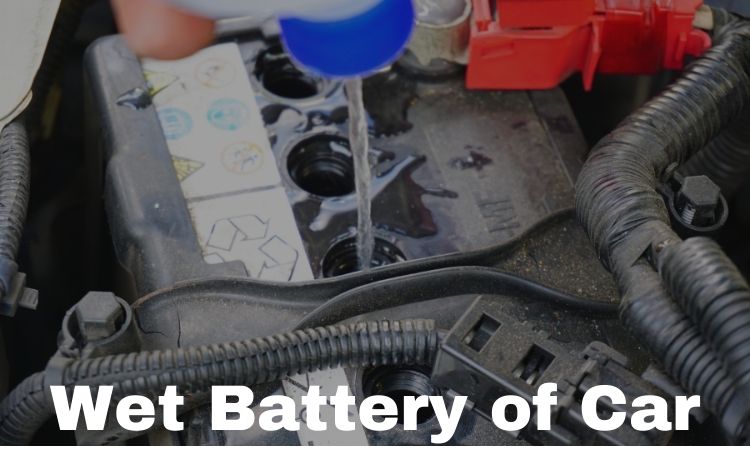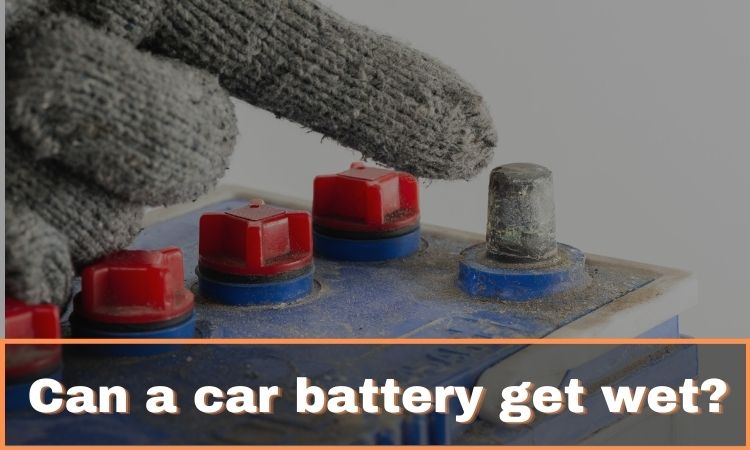A lot of people seem to think that a car battery can’t get wet. They see the battery as some kind of delicate electronic device that will be ruined if it gets wet. But is this really true? Can a car battery get wet without causing any damage?
Yes! And contrary to what some people believe, it won’t cause any damage. Just be sure to keep the terminals clean and you’ll be good to go. Safe driving!
In this article, we’ll explore the truth about car batteries and water. Spoiler alert: you can definitely get your car battery wet without damaging it!
Can a car battery get wet?
Here’s the thing: car batteries are designed to be able to withstand all sorts of weather conditions, including rain. In fact, most car batteries are actually sealed so that water can’t get inside and damage the delicate electrical components.
So if you’re caught in a rainstorm and your car battery gets wet, don’t worry! It’s not going to cause any damage.
However, there is one thing you need to be careful about when it comes to your car battery and water: making sure the terminals are clean. The terminals are the metal parts on the top of the battery where the cables connect.
If these get dirty or corroded, it can prevent the electrical current from flowing properly, which can lead to starting problems.
So if you do get your car battery wet, make sure to clean the terminals with a wire brush before you try to start your car.

Why Can My Car Battery Get Wet?
Your car battery can get wet for a few reasons: either water has seeped in through the vents on the top of the battery, or it’s been exposed to rain or snow.
In either case, water can cause problems for your battery because it disrupts the electrical current. You might not be able to start your car, or you could experience problems with the electrical system.
If you think your battery might be wet, it’s important to take it to a mechanic or auto parts store as soon as possible so they can test it and see if it needs to be replaced.
What happens if you get a battery wet?
If you have a wet battery, the first thing you should do is to remove it from the device it powers. Wet batteries can cause all sorts of damage to your electronics.
So it’s important to take them out as soon as possible. Once the battery is removed, try to dry it off with a towel or cloth. If the battery is dry, you can try to put it back in the device.
What temperature is bad for batteries?
Batteries are happiest when they’re between 20 and 30 degrees Celsius. Below freezing, or 0 degrees Celsius, the battery will begin to lose capacity.
At really cold temperatures, below -20 degrees Celsius, the battery will stop working entirely. On the other hand, if it gets too hot – above 45 degrees Celsius – the battery will also lose capacity.
If it gets too hot, above 60 degrees Celsius, the battery could catch fire. So, in short, keep your batteries away from extreme heat or cold!
Can Water Damage Car Batteries?
If you’ve ever accidentally spilled water on your car battery, you may have wondered if it could cause any damage. While water itself won’t directly damage your battery, it can lead to other problems that can shorten its lifespan or prevent it from working altogether.
Here’s what you need to know about how water can affect your car battery and what you can do to minimize the risk.
One of the most common ways that water can damage car batteries is by causing corrosion.
When water mixes with the sulfuric acid in your battery, it creates a corrosive substance that can eat away at the metal terminals and other parts of the battery. This can eventually cause your battery to fail completely.
To prevent this from happening, be sure to clean your battery terminals regularly with a solution of baking soda and water.
Another way that water can damage car batteries is by causing them to freeze. This is most likely to happen if you live in a cold climate and leave your car parked outside for long periods of time.
The water inside the battery can actually freeze and expand, which can damage the battery cells and prevent them from holding a charge.
If you think your battery might be frozen, don’t try to jump-start it. This could cause even more damage. Instead, take it to a professional who can safely thaw it out and test it to see if it needs to be replaced
What happens if a car battery gets submerged in water?
When a car battery gets submerged in water, it can cause a chemical reaction that will damage the battery. The battery may appear to work for a short time after being submerged, but the damage will eventually cause it to fail.
Another potential issue that can occur when a car battery gets submerged in water is corrosion. This can happen if the water is salty or contains other minerals.
The corrosion can damage the battery terminals and lead to electrical problems. If you notice any corrosion on your car battery, it is best to have it checked by a professional as soon as possible.
Is It Safe To Install A Car Battery In The Rain?
No, it is not safe to install a car battery in the rain.
The water can damage the battery and cause it to leak chemicals. If you must install a battery in the rain, be sure to wear gloves and protective clothing.
You should also avoid touching the terminals with your bare hands. Use a rag or towel to prevent contact with the water.
Can you charge a car battery in the rain?
No, you can’t charge a car battery in the rain. The water will damage the battery and shorten its lifespan. If you must charge your battery in the rain, cover the battery with a plastic bag to keep it dry. charging, car, battery, rain, water, damage, lifespan, plastic bag.
Is it Safe to Jumpstart A Car While It’s Raining?
The answer is both yes and no.
If you are jump starting a car that has an automatic transmission, it is safe to do so in the rain.
However, if you are jumpstarting a car with a manual transmission, it is not recommended to do so in the rain.
The reason for this is because when you are jumpstarting a car with a manual transmission, you need to be able to hold the clutch down while starting the car.
If you are holding the clutch down and your hand is wet, there is a chance that you could slip and injure yourself.
Therefore, it is best to wait until the rain has stopped before jumpstarting a car with a manual transmission.
How do I protect my Battery from getting wet?
Water damage is one of the most common causes of battery failure. If your battery gets wet, it’s important to take quick action to clean and dry it off. Otherwise, you run the risk of shorting out the battery or causing corrosion.
Here are a few tips for dealing with a wet battery:
If the battery is wet, remove it from the device immediately.
- Do not attempt to dry the battery with a heat source like a hair dryer, oven, or microwave. This can potentially cause a fire.
- If possible, disassemble the device and remove any other wet parts. This includes removing the SIM card and SD card, if applicable.
- Wipe down the wet parts with a clean, dry cloth. Isopropyl alcohol can be used to clean corrosion off of the battery terminals.
- Once the battery and other parts are dry, reassemble the device and power it on. If it doesn’t turn on, you may need to replace the battery.
If you’re not comfortable disassembling your device or cleaning the battery, you can take it to a professional for help. In most cases, however, following these steps will get your device up and running again in no time.
- Be sure to store your spare batteries in a dry place. If they get wet, follow the same steps as above to clean and dry them off.
- If you’re using a device in an environment where it might get wet, consider investing in a waterproof case or bag. This will help protect your device from water damage if it does happen to get wet.
By following these simple tips, you can help protect your device from water damage and keep it running smoothly for years to come.
Conclusion:
So there you have it! If your battery gets wet, take quick action to clean and dry it off. Otherwise, you run the risk of shorting out the battery or causing corrosion.
Be sure to store your spare batteries in a dry place, and if you’re using a device in an environment where it might get wet, consider investing in a waterproof case or bag.
By following these simple tips, you can help protect your device from water damage and keep it running smoothly for years to come.

